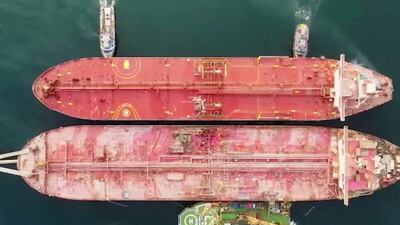The United Nations said on Friday it has completed the removal of more than one million barrels of oil from a decaying tanker off Yemen's Red Sea coast, avoiding what could have been a “monumental environmental and humanitarian catastrophe”.
UN officials have been warning for years that the tanker – called the Safer – was at risk of exploding and could spill four times as much oil as the 1989 Exxon Valdez disaster off Alaska.
The potential environmental disaster would have cost $20 billion to clean up.
UN Secretary-General Antonio Guterres welcomed the news that “the ship-to-ship transfer of oil from the FSO Safer to the Yemen replacement vessel has been safely concluded today, avoiding what could have been a monumental environmental and humanitarian catastrophe”.
In a statement, Mr Guterres reaffirmed the international organisation's commitment to “successfully” complete the project, which includes delivering a specialised buoy to which the replacement vessel, the Nautica, could be securely moored.
However, he said additional funding will be needed to finish the project and remove any remaining environmental threat to the Red Sea.
US Secretary of State Antony Blinken called on other countries to help raise the remaining funds to see the job through to the end.
“The UN urgently needs the international community and private sector’s financial support to fill the remaining $22 million funding gap needed to finish the job and address all remaining environmental threats.”
David Gressly, the UN Humanitarian Coordinator for Yemen who has led UN efforts involving the Safer since September 2021, said the work needs to be finished.
“The installation of a CALM buoy to which the replacement vessel will be safely tethered is the next crucial step,” said Mr Gressly.
Linda Thomas-Greenfield, US ambassador to the UN, praised the global response, stating that without decisive action, the shores of the Horn of Africa and Arabian Peninsula would have been “polluted, exposing communities to deadly toxins, and contaminating drinking water supplies for the entire region”.
“At a time when the world faces a host of pressing crises, this is a bright spot, and a model example of international co-operation,” she said.
The operation began after a technical support ship arrived on site off the coast of Ras Isa at the end of May.
UN officials and the international community have been warning for years that the Red Sea and Yemen's coastline were at risk.
Earlier Yemen's Foreign Minister Ahmed bin Mubarak had said on Twitter that the oil removal would be completed by the end of the day “after major UN and international operations”.
“The first goal was the success of the operation to save seas, coasts and beaches of Yemen and the countries of the region from an imminent environmental disaster,” he said.
The Iran-backed Houthi rebels were obstructing national and international efforts to address this disaster, the Foreign Minister said.
Remaining risk
Experts are warning that a risk remains if the oil is not completely taken off the water.
“If the Nautica moved with the oil on board, then we got rid of the problem. But if it remains, which seems likely to happen, then we have not got rid of the problem but simply moved the oil from one ship to another – therefore giving the Houthis control of two vessels,” the former head of Yemen's Environment Protection Agency Abdelqader Al Kharraz told The National.
The Nautica, although decades younger than the Safer, is 15 years old – and has roughly five years left in its lifespan.
Maritime law expert Ian Ralby said that although the main risk of an oil spill has been averted, the will to completely resolve the environmental issue must remain until a more long-term solution is reached.
“We must maintain vigilance in pursuing a complete and permanent resolution of this matter and ensuring that the oil … gets off the water and a permanent replacement of the facility is actually established on land and out of harm's way of the Red Sea.”
The risk, Mr Ralby said, lies largely with the oil's geographical location.
“We're talking about a coastal area of a country that's been at war since 2015. There are still mines in the sea and opportunities for upticks in violence that we've seen in the past year, and specifically targeted towards oil tankers,” he said referring to recent Houthi attacks on oil terminals.
“And so, whereas yes, we now have a much lower risk of a spill caused by the deterioration of a vessel, there's still a chance of a problem that arises from an attack on it. As a sitting target, there's an opportunity [for parties] to try to spark a new conflict or change the course of where things are heading.”
For years the tanker was at risk of breaking up or exploding after it was left unattended and decaying following the outbreak of war in Yemen in 2014.
The UN launched a fund-raising drive, even starting a crowdfunding campaign, to raise the $129 million needed to transfer the oil from the Safer to the Nautica, which sailed from China in early April.
The salvage operation cannot be paid for by the sale of the oil because it is not clear who owns it, the UN said.
Initiatives geared to political process have gained momentum since Riyadh and Tehran in March agreed to restore diplomatic ties severed in 2016.
The Houthis seized the capital, Sanaa, in 2014. A year later, a Saudi-led coalition intervened at the invitation of the government.

